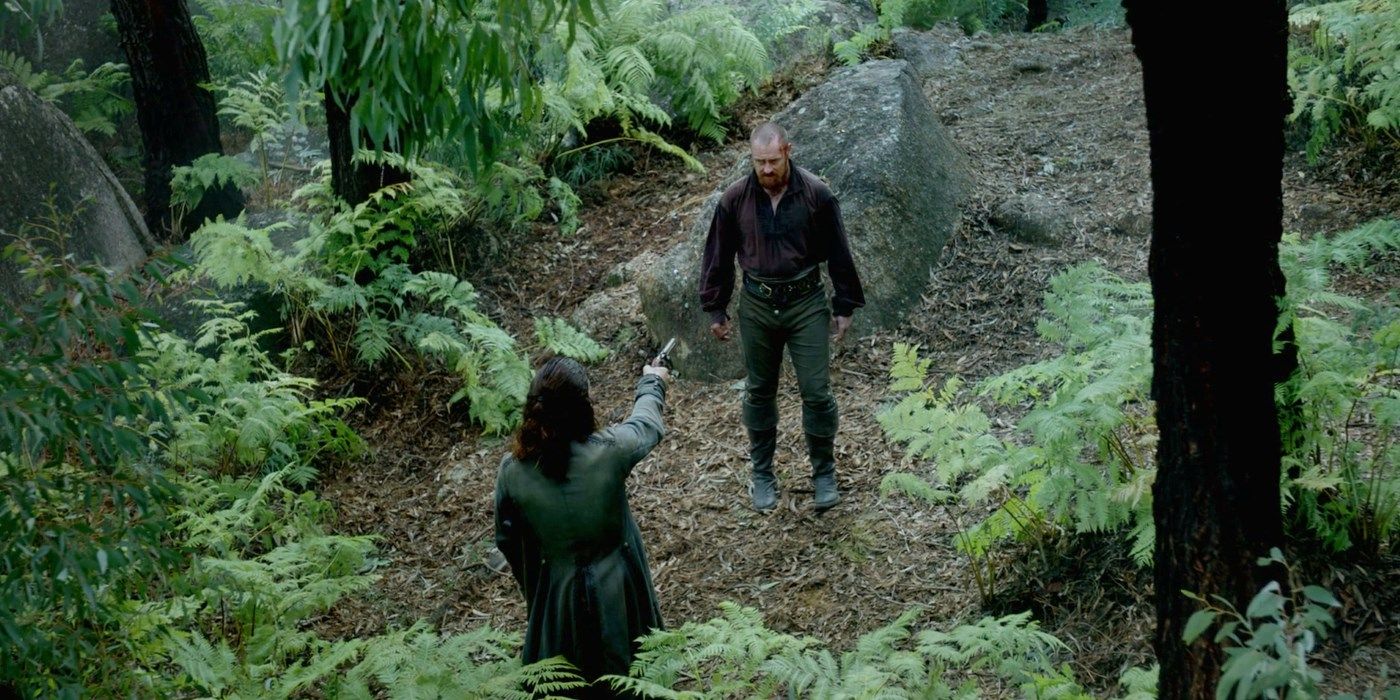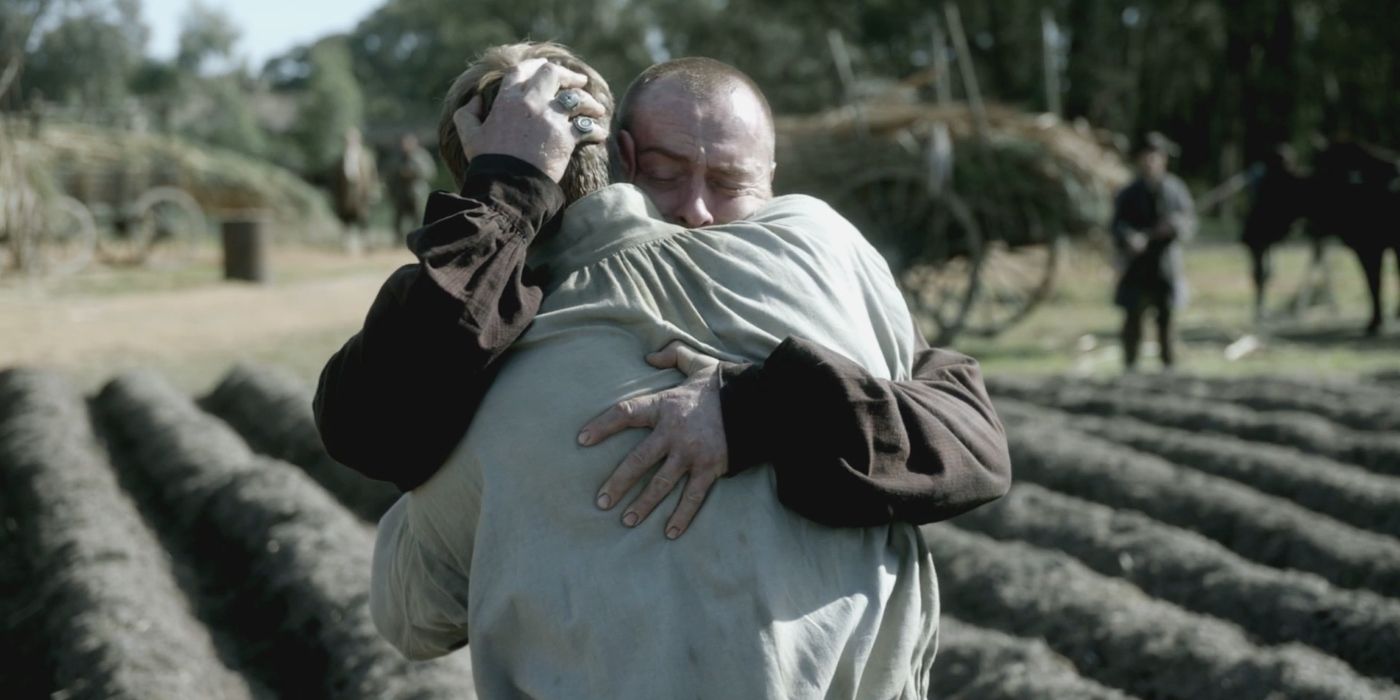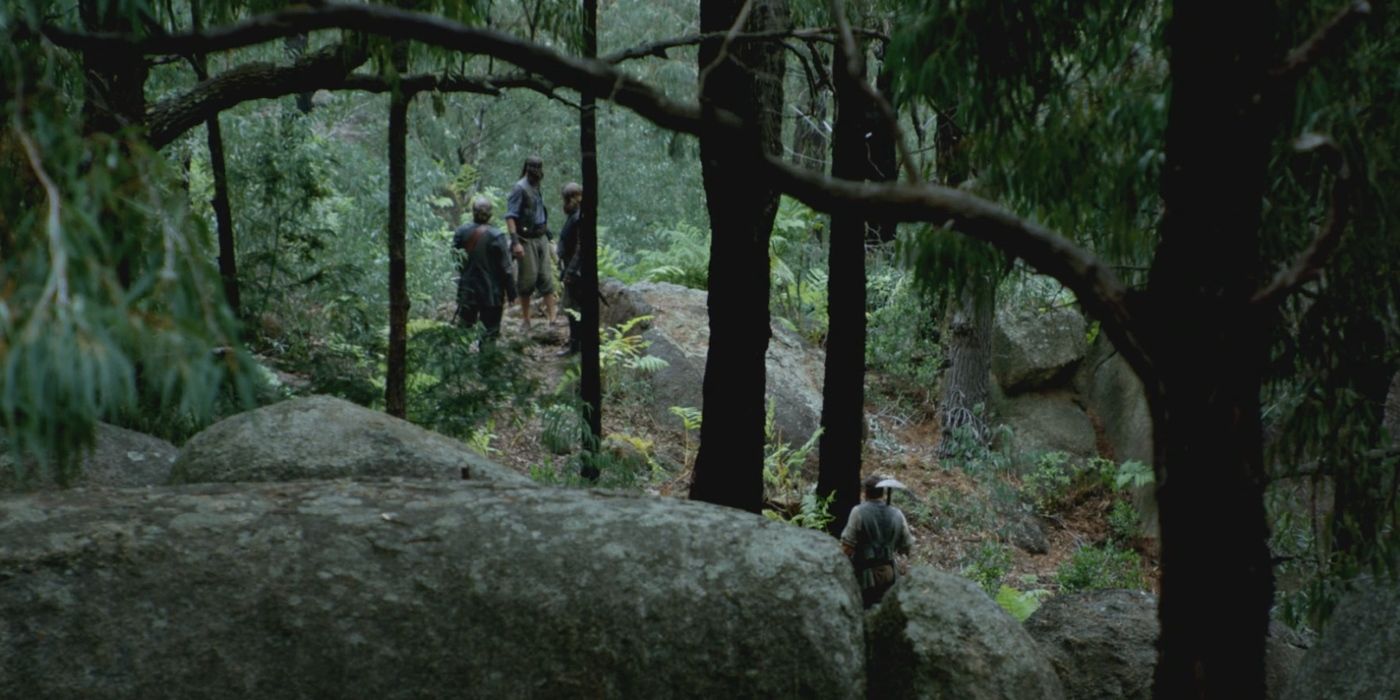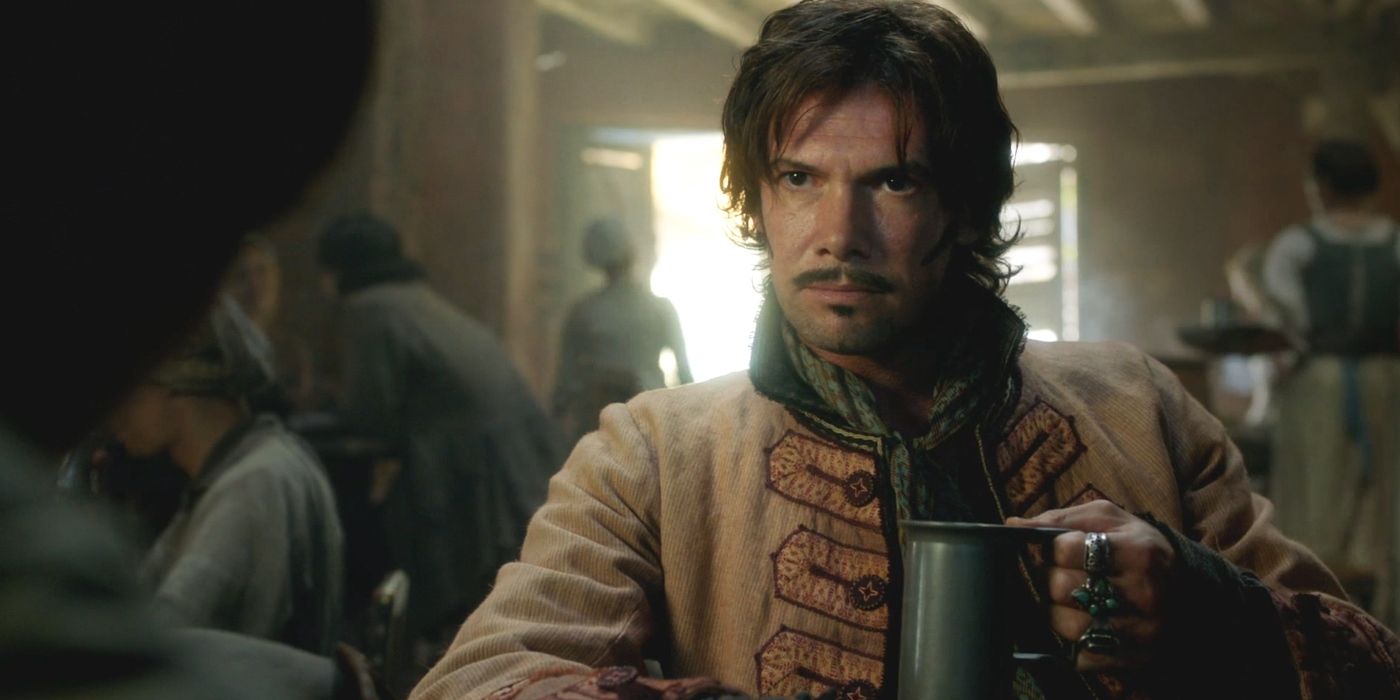WARNING: This article contains SPOILERS for Black Sails series finale
-
After four seasons of pirate drama, unpredictable twists, and too many dives into the heart of darkness to count, Black Sails has come to an end. Thankfully for fans of its hero Captain Flint, that ending was a happy one... right? The creators, writers, directors, and cinematographers of the Starz pirate drama have always relied upon more than the explicit plot and dialogue to tell the story. So as pleasant as the finale scenes of the Black Sails finale may be on the surface, there's some evidence suggesting that Flint's real ending wasn't quite so perfect.
Needless to say, curious readers who have yet to see the finale or the series for themselves should stop and solve that problem immediately (we can't stress this enough). As the conflicting motives of John Silver's love for a woman and Flint's desire for revolution came to a head, fans watched with breath caught in their throats. The creators have offered comments that seem to suggest the show's presentation of what came next is that simple... but could simply be a commitment to ambiguity. Or, as many are sure to claim as more and more Black Sails fans are born, Flint's ending was spun into a larger story - while James McGraw grew cold on a jungle foor.
What Viewers Saw
Just as things seemed to be going in a hopeful direction - Flint, Silver, and Rackham defeating the villainous Woodes Rogers, and remembering their strength when united - treachery struck. Not exciting, thrilling, or intriguing treachery... but a tragic, and unavoidable one. As Flint led Silver and his men to the location of the buried treasure (destined to become 'Captain Flint's treasure' in the sequel Treasure Island novel), he paused, acknowledging that he knew a partnership would not come next. Ever the friend, Silver couldn't deceive or dispute.
Flint intended to use the treasure to fund a revolution that would, if done right, echo through the New World. Silver, having felt his own love's (presumed) death, believed he had seen Flint's war for what it truly was: the senseless violence of a man with nothing left to lose. Flint promised that if Silver really did sacrifice power, leadership, legend, infamy, and revolution for a simple life, he would regret it. And when he did, he would know that in this moment - standing opposite Captain Flint, gun pointed at his chest, refusing him - he had made the wrong choice.
It was a tragic moment for viewers who had watched these two men become closer than brothers, and Silver begging Flint to yield willingly was most certainly genuine. The last image depicted the two men standing motionless, Silver's gun on Flint, with all well aware the latter could never do what was being asked of him. What came next... is where things get interesting.
Flint's Happy Ending
From there, the action cuts to Jack Rackham finalizing the deal with the Guthrie empire, revealing that Flint had not been killed... he had "retired." He views it as a success, having avoided Flint's martyrdom, and believing that Flint having found something that mattered more to him than war was a story that carry a great distance. But the details of Flint's "retirement" are expressed by Silver to the devastated Madi - with some footage accompanying Silver's account (or the "real" version of the events, delivered explicitly to the viewer, and not Silver).
Silver reveals he had sent a man to the Savannah, Georgia plantation where wealthy London families sent their disgraced or outcast relatives to live in total anonymity, dead to the world. That man was sent to ask if Thomas Hamilton had been incarcerated there, and returned with word that he had. Having held this card the entire time, Silver used it to finally "unmake" Flint. Taking him to the work farm, Silver claims that he saw McGraw re-emerge as he grew closer to the man he had lived, and whose death had given birth to Flint.
Flint arrives escorted by Israel Hands and Silver's original scout, money changes hands, and Flint is escorted to Thomas... where their reunion is every bit what fans would have hoped. Either Flint and Thomas will then head off to start a new life or, more likely, Silver has paid to have Flint join Thomas and be forgotten by the world. Either way, it's the happy ending Flint deserved, and Madi eventually realizes Silver did the best he could for their love, and she returns to his side.
It is, on its surface, the kind of happy ending the creators never intended to deny their audience. As close to death as Flint may have seemed at times, Black Sails' function as a prequel to Robert Louis Stevenson's Treasure Island demanded Flint live. After all, according to that story, he doesn't die as much as decades after these events. In an interview with Collider series creator Jonathan Steinberg confirms the happy ending is as it appears... while at the same time conceding that there being ambiguity, or possible clues to an alternate interpretation was perfectly in keeping with the show and its themes of storytelling:
"When you read the book, you’re told that Flint died in a very specific way, and it’s a way that doesn’t immediately suggest story. He died alone, some indeterminate period of time after the exciting stuff happened, and he died in a very lonely, sad place. When we talked about planting flags in the ground of things that we considered to be canon, and you have to account for them, that was one of them. It felt like it was important, and it felt like a challenge to figure out how we could acknowledge that and also make it work for us, and recontextualize it and make it a bit of a mystery. There’s a lot of people telling a lot of stories in Treasure Island, and a lot of people telling stories in this show. If this show is about anything, it’s about the fact that narrative can be a very powerful thing, when used properly. So, it felt right that the ending was steeped in that idea."
The always-intentional lighting and color grading of the work farm may cue viewers in to a potential fantasy, but there may be just as much evidence supporting the happier ending. After all, among the dimly lit office of the farm's proprietor is a bright, green pear - the fruit referred to as a "gift from the gods" to Odysseus in Homer's Odyssey, to whom Flint compared himself in the very first episode.
Nevertheless, there are a few answers or details that may seem hastily sketched over in the name of giving the characters the endings they deserved... but might actually suggest a far darker ending, written by John Silver himself.
Silver Kills Flint?
As we mentioned above, it's hard to believe that Silver could have said anything to convince Flint to give up his cause. But even if Thomas's existence would give Flint pause, Silver's account of their journey to Savannah is a bit crudely drawn. Did he subdue Flint, before escorting him, unbelieving of the fact that Thomas yet lived? And if Silver offered the firsthand account of the changes undergone by Flint as Thomas grew closer, we're to believe he never saw Flint through to Thomas?
To keep things simple, let's start at the beginning. Specifically, the shot of Silver with a gun trained on Flint, begging him to yield. The camera then cuts to Silver's men resting nearby - who turn their heads in response to an unheard (to the viewer) noise, as only the reaction of birds squawking and distant wings flapping can be heard. Having presumably known what Silver had planned the men don't react instantly - as if summoned - or panicked, as if a scuffle has broken out.
They stand for a few moments considering what they've heard, before quickly, but calmly following to inspect what has transpired off-camera. An event that, while unheard, carried with it the immediate reactions that would follow, in this context, a gunshot.
Even if the scenes of Flint returning to Thomas were filmed without the slightest overt shot construction or dreamlike qualities, Jack's following scene with Max and the matron of the Guthrie family makes the skeptics' case. Simply put: no matter what happened, there was no way they were going to say the Flint had been killed. Despite death being a far more "definitive" ending to Flint's life, Jack reveals that his "retirement" to a happier life is "far more effective."
"For if our intent was to extinguish his war, feeding it a martyr seems like an odd way of going about it. Flint had allies who would only have been emboldened by his death. Some of whom, had they the desire, could and would have fought his war without him to honor his memory. Instead of a martyr, we have fed it... a story. A tragedy that defused their fighting spirit and enabled the more moderate voices to press for a more moderate solution.
"I can tell you whatever it is you want to hear about Flint's whereabouts. He's dead. He's retired. The truth of it matters not at all."
That idea of a story taking on a life of its own speaks as much to the chronicle of Flint's life as it does to the show as a whole (Jack's had a bit of a knack with that kind of narrative layering). Unfortunately, if it's true that the story of Flint's happy ending was concocted... it means John Silver is every bit the villain he tells Madi that he isn't. It's a bit hard to believe that between Max informing him of the secret work farm - shortly before she was returned to the fort, and the deal to surrender Nassau was offered - and the Spanish arriving, Silver's man sailed from Nassau to Georgia and back. If he's lying about one part of the story, he's conjuring every bit of it in hopes that he could defy Flint's previous claim, and truly convince Madi to choose him and not the war.
The show does invite the theory, since the story Silver spins for Madi is eerily similar to his most convincing and persuasive parables used to manipulate in the past (he even uses the same language when he spoke to Flint earlier). It would be thematically resonant for Silver's journey that to put 'Long John Silver' behind him, he must weave the darkest web of lies yet, to the one he loves... just to keep her. There's symbolism and shot construction to support his claim, too. Greek mythology has played a rich role in the show to this point, and the Elysian Fields-esque look of the work farm won't be missed by many.
Silver also uses the same language of the work farm proprietor in describing those who are imprisoned there - supporting the idea that he did send a man to investigate, but not that he found Thomas Hamilton alive and well. And when a place of reunion between a man thought dead and another man who might be dead is described as a place 'from whence no man ever returns' or 'simply ceases to be'... you're asking for it. And on the Greek mythology route, Silver's men handing money to the man who figuratively 'ferries' Flint into the afterlife he thought Thomas now occupied can be taken as anther hint of Silver's true thinking.
The Final Verdict
Fans are free to make up their own minds, recognizing that the creators allowed for some telling shots, or ambiguity to make viewers ask these very questions. Were they a misdirect in the moment, or a hint that Silver's storytelling eventually told the story of Black Sails? The creators have, on the surface, suggested that ending should be taken as a reunion, which is still true if Flint and Thomas are only reunited in the afterlife. In the end, it's probably best to let fans approach the conversation with all the enthusiasm and analysis the show has warranted thus far.
And, as always, Jack Rackham deserves the last word:
"A story is true. A story is untrue. As time extends it matters less and less. The stories we want to be believe... those are the ones that survive, despite upheaval and transition, and progress. Those are the stories that shape history. And then what does it matter if it was true when it was born? It's found truth in its maturity... Because what's it all for if it goes unremembered? It's the art that leaves the mark. But to leave it, it must transcend. It must speak for itself. It must be true."
Source: Collider








